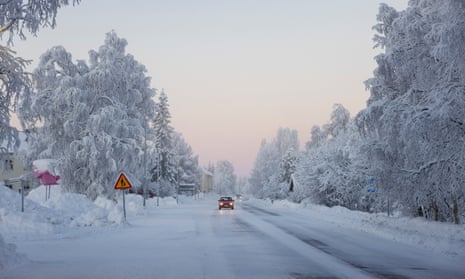
Extreme cold and relentless snowstorms have thrown transportation into disarray and led to school closures across Scandinavia. Simultaneously, western Europe faces strong winds and heavy rain, resulting in flooding and tragic consequences.
In the Nordic region, temperatures plummeted to below -40C for a consecutive second day, reaching a staggering -43.6C in Kvikkjokk-Årrenjarka, Swedish Lapland—the lowest January temperature in Sweden in 25 years, as reported by Sweden’s TT news agency.
The harsh conditions, marked by frigid temperatures, heavy snowfall, and gale-force winds, disrupted transportation throughout Scandinavia. Numerous bridges were closed, and some train and ferry services were suspended, prompting the closure of several schools in the region.
In Denmark, police advised motorists to avoid unnecessary trips due to the onslaught of wind and snow in the northern and western parts of the country.
The wave of cold air originating from Siberia and the Arctic also swept into western Russia, causing temperatures in Moscow and surrounding areas to plunge to -30C, well below the average for early January. Authorities issued orange weather warnings in Moscow, St Petersburg, and other regions, cautioning residents about potential health risks.
Meanwhile, further south, mild yet wet and windy conditions prevailed as a storm named Henk wreaked havoc in parts of western Europe.
In the UK, tragedy struck as a driver lost his life when a tree fell on his car in western England near the town of Kemble. Storm Henk, recognized by the official weather services of Britain, Ireland, and the Netherlands, caused power outages, transportation issues, property damage, and widespread disruption across the UK. Over 300 flood warnings were in effect across England and Wales, with 10,000 homes still without power. A severe flood alert was issued for the River Nene in central England, leading to evacuations at the Billing Aquadrome.
In the Netherlands, strong winds were suspected to be a factor in the death of a 75-year-old man who fell off his bicycle. Additionally, a small section of a dyke regulating water levels was washed away, prompting evacuations of houseboats near Maastricht.
In France, heavy rains battered the northern Pas-de-Calais and Nord regions, resulting in the evacuation of around 200 people and power outages for 10,000 households. Flooded roads in Blendecques forced residents in flood-prone areas to restrict their movements until water levels subsided. Emergency workers from France, Czechia, Slovakia, and the Netherlands collaborated to rescue people, clear roads, and divert water away from the worst-hit towns.
Northern France and its borders with Belgium, Luxembourg, and Germany continue to face flood and wind warnings, with forecasts predicting more rain and winds reaching up to 100kph. Parts of Germany, especially the north-western state of Lower Saxony, are also grappling with flooding, with the situation potentially exacerbated by additional rainfall.
